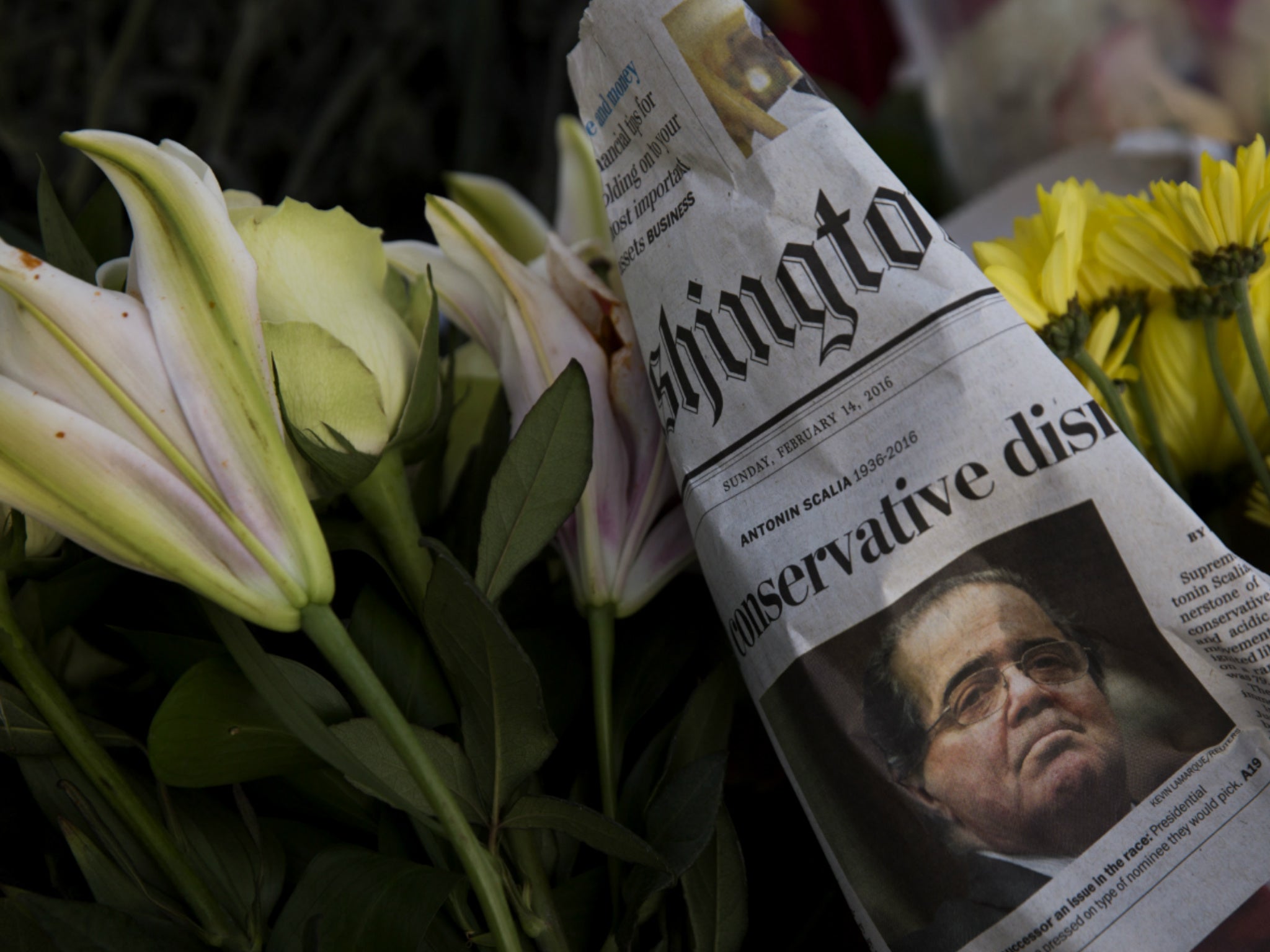The Independent's journalism is supported by our readers. When you purchase through links on our site, we may earn commission.
Antonin Scalia's replacement will change America’s future – but how much and in what direction?
The lifetime tenure of a Supreme Court judge means that they can shape the country’s policies and values for decades

The death of Supreme Court Justice Antonin Scalia has sent shockwaves throughout America and the world. He was the leading conservative legal voice of his generation – famous or infamous depending on your perspective for his rulings and opinions on issues ranging from the right for individuals to bear arms to campaign funding by corporations, from racial discrimination legislation to the rights of “terrorist” detainees.
The impact of his passing remains uncertain. At the very least it sets the stage for a fiercely partisan battle over his replacement. President Obama will want to appoint a liberal judge, although the Republican Senate has already declared their intention to reject any such nomination.
Whatever happens, the process will have significant ramifications for the 2016 Presidential election. Yet the stakes are much higher than any election, even a presidential one. The lifetime tenure of a Supreme Court judge means that they can shape the country’s policies and values for decades. This influence is even greater in this particular instance as if Obama gets his way the next judge will almost certainly shift the Court’s balance of power in a more liberal direction.
The consequences of this change will be felt in the short-term, regardless of what Republicans choose to do. In the event of a Justice’s death, all unresolved cases revert back to the previous rulings of the next lower court. Presently this would mean a victory for public sector unions, the continuation of immigrant deportations and the closing of a number of abortion clinics in certain states.
Looking further ahead, a more liberal court could be a dramatic force for progressive change nationally. Only last year, the Court legalised gay marriage despite the vigorous dissent of Scalia. With a liberal majority the court could uphold tougher campaign finance laws, reaffirm abortion rights for women and expand labour protections among other hot button issues.
Putting aside for the moment the partisan battles and looming legal decisions ahead, this is an opportunity to fundamentally debate and change the role of the court as a force for social progress. It harkens back to a time not so long ago in the post WWII in which the Supreme Court made landmark decisions ending racial segregation and legalising abortion.
Under its current leadership, however, the Court has retreated from this more activist role. Scalia in particular was a public spokesman for a court that used its power to preserve American traditions and accepted moralities – leading to charges that he was trying to create a “majoritarian theocracy”.
Philosophically he promoted the “originalist” and “textualist” approaches to constitutional interpretation. The former demands that judges adhere strictly too the original intentions of the founding writers, and the latter that such interpretations prioritise the actual text rather than broader socio-political context.
These are not mere esoteric legal debates. They go to the heart of what America is and could be. Where the founders creating a country that respected religious pluralism but embraced then and forever a guiding Christian morality? Or was it a revolutionary nation committed – even if only ever partially – to ideals of freedom, equality and toleration? Should it remain committed to an ethics formed over three centuries ago or continually update its founding spirit to changing times?
At stake is whether America looks backward or forward to discover its purpose and soul. It represents a constitutional history that is both inspiring and with retrospect appalling. The same constitution that enshrined free speech is the same one that justified slavery and later legalised racial inequality all the way up to the middle of the 20th Century. The same constitution that safeguarded citizens against arbitrary arrest by governments is the same one whose formal protection of armed militias presently legitimates a multi-billion dollar domestic weapons industry with increasingly tragic human consequences.
It is a legacy, therefore, as complicated as the country which it founded and the world in which it was created. It is full of both hope and contradiction. Where many of its most prominent revolutionary writers were slaveholders. In their wisdom and blindness, they created a Supreme Court that protected the sovereignty of Native Americans while doing little to stop their genocide. That served as a bulwark against government intrusion while upholding the forced eviction of over a hundred thousand Japanese citizens in the Second World War. That made imperialism lawful despite itself being born in the desire for independence. That bans “cruel and unusual punishment” yet has refused to hold the US government completely accountable for its use of torture as part of the War on Terror.
The 21th Century brings its own tests of progress. How will it address the problems of a democracy threatened by the stranglehold of corporate interests, the rights of citizens to privacy in the information age, the balance between the country’s ideals and what it proclaims it must do in the name of “national security”. Will it be up to the challenges of ensuring that a rapidly changing economy is not only strictly constitutional, but in keeping with its progressive principles handed down from its imperfect past?
Peter Bloom is a lecturer in the Department of People and Organisations at the Open University. His book, 'Authoritarian Capitalism in the Age of Globalization' will be released in March of this year.
Join our commenting forum
Join thought-provoking conversations, follow other Independent readers and see their replies
Comments
Bookmark popover
Removed from bookmarks